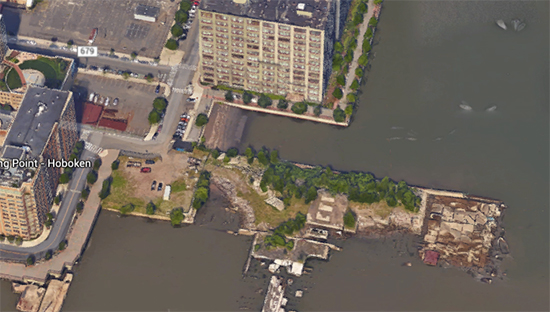FBW | September 21, 2016
During closed sessions at the last two Hoboken City Council meetings, attorney Joe Maraziti of Maraziti Falcon briefed the Council about settlement talks that have been underway between the City and developers Michael and David Barry. The developers have proposed to withdraw their proposal to build the controversial Monarch Towers at the Shipyard project in exchange for added density for another project that they own at 800-822 Monroe Street in Hoboken. Thus far, the talks have excluded two other parties to the Monarch litigation: the Hudson Tea Building Condo Association and the Fund for a Better Waterfront (FBW).
In July of 2011, the Barrys, brothers who are the owners and developers of the Shipyard Project, acquired 800-822 Monroe Street after the property ended up in bankruptcy court. In that same year, these developers applied for a waterfront development permit from the New Jersey Department of Environmental Protection (NJDEP) to build the Monarch project, two 11-story towers comprising 78 units at a pier at the north end of the Shipyard project. The NJDEP granted Shipyard Associates the permit in December 2011.
The Monarch Towers sparked heated controversy due to the fact that the Hoboken Planning Board approval of the Shipyard Project in 1997 and the developer’s agreement with the City stipulated that Development Block G, the site for the proposed towers, was to be developed as open space. The site was to include tennis courts, a tennis pavilion and a portion of the Hudson River Waterfront Walkway. The developers were required to build Block G after completion of the final 1160 residential units which occurred in 2011. The City of Hoboken, the Hudson Tea Building Condo Association and FBW have all sought to enforce the developer’s agreement and defeat the proposal for the Monarch Towers. Shipyard Associates has aggressively pressed for its approvals through the courts. What ensued has been five years of relentless litigation. Currently, there are five cases pending before New Jersey Superior Court, four at the Appellate Division, appeals of lower court rulings, all with respect to the fate of Block G.
800-822 Monroe is a 1.4 acre site in northwest Hoboken that the City designated as a redevelopment area in 1998. The state’s redevelopment statute requires a municipality to designate a “redeveloper” for properties in redevelopment zones. David and Michael Barry, however, proceeded with their application before the Hoboken Planning Board without being designated as the redeveloper. On February 3, 2015, the Board rejected the application, having determined that the applicant did not have standing since the City had not designated them as the “redeveloper.”
Lawyers for the Barrys first filed motions with the Bankruptcy Court that were denied. They then took their case to Hudson County Superior Court. Dennis Galvin, the attorney for the Hoboken Planning Board, argued in his brief that this was a case of “development by intimidation . . . attempting to bully the Board into ignoring the Law, under threat of automatic approval.” This is the same tactic used successfully by the developers in the Monarch litigation. In March of this year, Superior Court Judge Jeffrey R. Jablonski granted summary judgment in favor of the Hoboken Planning Board on all counts. Subsequently, the developers appealed this decision as well to the Appellate Division and it too is pending.

The Shipyard developers reneged on their promise to provide about 1.5 acres of open space at this pier as the final stage of their 1600-unit Shipyard project.
On September 20, 2016, FBW wrote a letter to the Mayor and Council stating, “First, and foremost, FBW wants to preserve the open space commitment made by the developer at the waterfront. The 1996 agreement and Hoboken Planning Board approvals at that time included the commitment to provide open space on Development Block G, which is approximately 1.5 acres.” FBW proposed that the developers build it as a public park and then donate the land to the City so that it remains a public park in perpetuity.
The City has not shared with FBW any details concerning the settlement discussions. Typically, all parties to the litigation would be at the table. This is not the case here. Nonetheless, before any settlement can be finalized, all parties must agree to the terms. FBW is committed to ensuring that the Barrys uphold their obligation to provide open space as required when they received permission to build the Planned Unit Development known as the “Shipyard project.”
Related links
Final legal dispute over Monarch Towers reaches NJ Supreme Court
NJ Supreme Court will rule on Monarch Towers dispute
Appellate Court ruling disregards well-established New Jersey land use case law
Monarch Towers sparks legal arguments over automatic approvals, changed circumstances, etc.
Appellate Court will hear appeal of 3 Monarch Towers cases
City settlement would shower tens of millions in benefits on Shipyard developers
Settlement proposed to end 5 year legal battle over Monarch Towers
Did NJDEP ignore its own coastal zone regs in granting permit? Appellate Court to decide
‘Rapacious’ developer must defend broken agreement in Appellate Court
Monarch towers case goes to Appellate Court
Monarch Towers litigation grinds on as public opposition persists
Federal judge grants FBW opportunity to help defend Hoboken’s flood ordinances
Developers challenge Hoboken flood ordinance in federal court
Judge grants automatic approval for controversial Monarch Towers
Monarch Towers described as classic case of bait and switch
Shipyard’s plan to privatize pier

